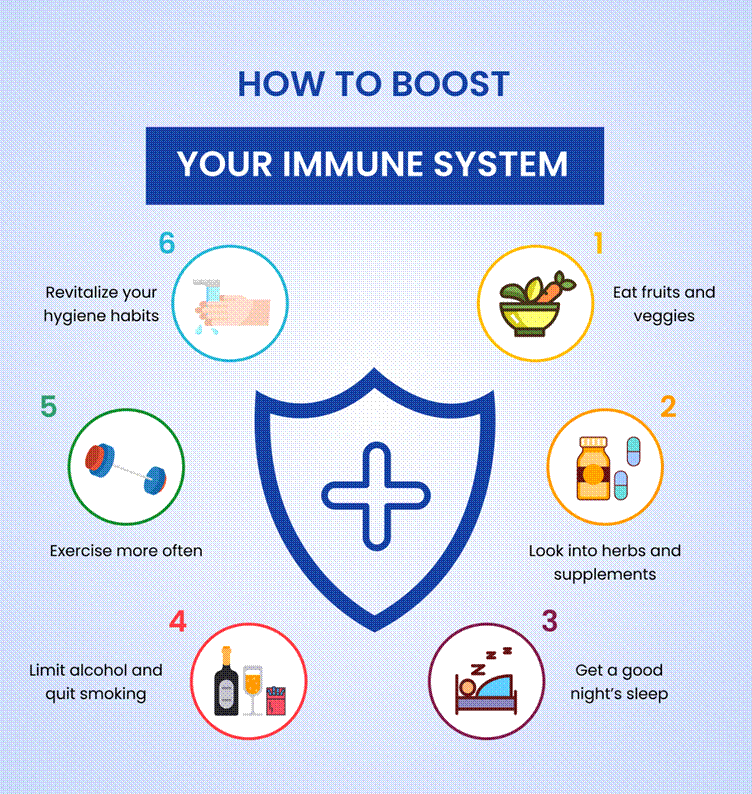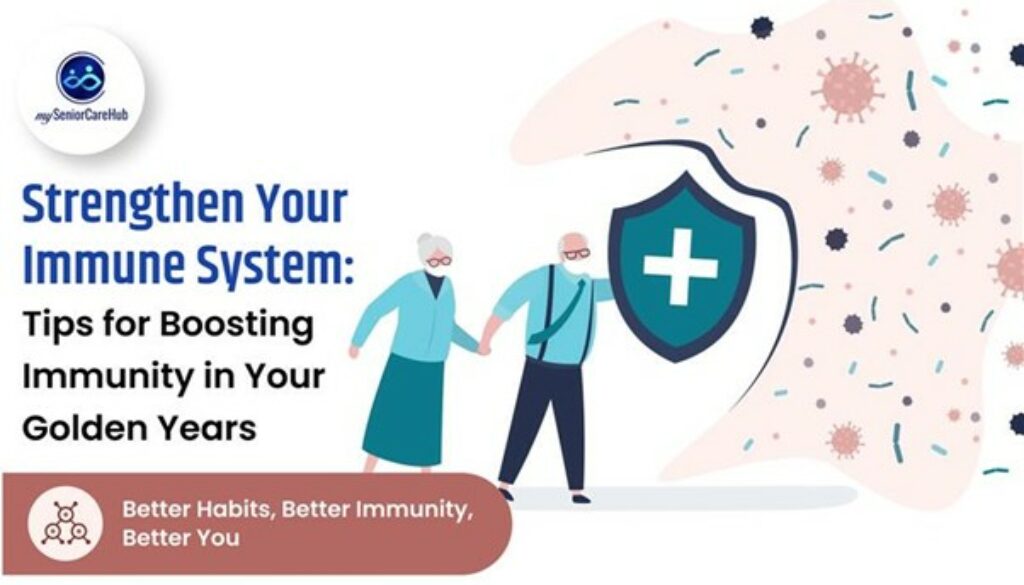How Seniors Can Strengthen Their Immune System and Fight Infections.
The Truth About Aging and Immunity: What Science Reveals
As we grow older, our bodies naturally slow down, and so does our immune system. This decline, known as immunosenescence, makes seniors more vulnerable to infections, slower wound healing, and chronic diseases. According to the National Institute on Aging, immune cells in older adults respond less efficiently to new threats, which is why even common colds or flu can feel harder to recover from. But here’s the good news: science says you can strengthen your immune system at any age. You can help your body fight back stronger and feel better every day by adopting a few easy, everyday habits, such as eating healthily, exercising, and getting enough sleep. We will look at some strategies to help boost your immune system as you age. We will also look at tools like mySeniorCareHub, which can be a useful partner.
Why Does Immunity Decline with Age?
The immune system, our body’s defence mechanism, deteriorates as we age. It consists of unique cells that aid in healing and fighting infections, such as white blood cells and T-cells. However, as we age, the body produces fewer of these cells, and their functionality decreases. Consequently, infections are more likely to occur, making recovery more challenging.
| What Changes with Age | What It Means |
| Fewer T-cells are made (due to a shrinking thymus) | The body responds more slowly to new infections. |
| Bone marrow slows down (fewer white blood cells) | The immune system takes longer to fight off illness. |
| Higher inflammation (known as “inflammaging”) | Chronic inflammation further weakens immunity. |
| Weaker vaccine response | Older adults may need regular boosters for better protection. |

Research published in Nature Reviews Immunology shows that both innate and adaptive immunity are affected by age. Fortunately, following the right daily routine can support and strengthen your immune system even as you age.
Tips to Boost Your Immune Health
Tip 1: Eat a Rainbow of Fruits and Vegetables
A colourful plate means a variety of nutrients, and that’s exactly what your immune system needs. Brightly coloured fruits and vegetables are packed with antioxidants, vitamins (like A, C, and E), and minerals (like zinc and selenium), all of which help protect your body and fight infections. Studies show that older adults who eat more fruits and vegetables tend to have stronger immune responses and fewer infections. Try to eat at least four or five different coloured fruits or vegetables every day, such as beets, oranges, tomatoes, spinach, and carrots.
Tip 2: Stay Active with Regular Exercise
Exercise is a powerful tool for keeping your immune system strong and healthy. Even light activities can boost your immune system and help you stay protected against illness.
- Improves blood circulation: Regular exercise helps blood flow more easily, allowing immune cells to travel throughout the body and fight infections more effectively.
- Reduces inflammation: Physical activity lowers inflammation, which is often linked to a weakened immune system.
- Boosts white blood cell production: Regular exercise can help increase the production of white blood cells, the body’s natural defence against pathogens.
- Lowers the risk of chronic diseases: Conditions like diabetes or heart disease can weaken immunity, but staying active can help manage and prevent these.
Tip 3: Prioritize Quality Sleep
Getting enough sleep is essential for a strong immune system. While you rest, your body works to repair and strengthen its defences. When you don’t sleep enough, your immune system’s ability to fight off infections is weakened, leaving you more prone to illness.
Try to get between 7 and 9 hours every night. Establishing a relaxing bedtime routine, which includes reading a book, avoiding screens, and keeping your bedroom quiet and cool, can help you sleep better.
Tip 4: Manage Stress Effectively
Chronic stress can weaken your immune system, making it harder for your body to defend itself against infections. When you’re under stress, your body releases stress hormones like cortisol, which can suppress the function of white blood cells—the body’s primary defence against illness. Long-term stress can also lead to increased inflammation, a factor that can worsen conditions like psoriasis, an autoimmune disease in which the immune system mistakenly attacks healthy skin cells, resulting in red, scaly patches. Stress has been shown to trigger flare-ups in psoriasis, making it even more important to manage stress effectively to avoid aggravating such conditions. You can enhance your immune system, reduce inflammation, and lessen stress by engaging in deep breathing, mindfulness, and scheduling hobbies or physical exercise.
Tip 5: Optimize Vitamin D Levels for Immune Activation
Vitamin D plays a crucial role in activating the immune system. A deficiency in vitamin D is linked to a heightened risk of infections and autoimmune conditions such as rheumatoid arthritis and multiple sclerosis.
Vitamin D supplementation may reduce the risk of respiratory infections, such as the flu and pneumonia, particularly in individuals with low baseline levels of the vitamin, according to a study published in The Lancet. Due to decreased skin synthesis and reduced sun exposure, seniors often have lower vitamin D levels.
Ensure you are obtaining sufficient vitamin D by spending time in the sun and consuming foods rich in vitamin D, like salmon, fortified dairy products, and egg yolks. Supplementation may also be advised, with 800–1000 IU of vitamin D recommended daily, especially for those with low levels.
Tip 6: Support Your Gut Microbiome for Immune Defence
Did you know that most of your immune system lives in your gut? Your stomach and intestines not only digest food but also aid in the body’s defence against infections. This is because your gut’s beneficial bacteria communicate with and support your immune cells.
When the gut is healthy and full of these helpful bacteria, your body can fight infections, reduce swelling (inflammation), and even respond better to vaccines. But when there’s an imbalance—too many bad bacteria or not enough good ones—it can lead to problems like more infections, allergies, or even diseases like diabetes and digestive issues.
Here’s how to keep your gut strong:
- Eat fermented foods like curd, buttermilk, and pickles—they give your body good bacteria.
- Probiotics and Prebiotics: These marketed formulations helps to strengthen the immunity.
- Add fibre-rich foods like fruits, oats, dal, and salad to feed the good bacteria.
- Avoid too much junk food and unnecessary antibiotics, which can harm your gut health.
Tip7: Keep Inflammation in Check with Omega-3s

As we age, our body tends to stay in a state of low-grade chronic inflammation, which weakens the immune system over time. Numerous age-related illnesses, including cancer, heart disease, arthritis, and Alzheimer’s, have been connected to this kind of inflammation.
One way to reduce this harmful inflammation is by eating foods rich in omega-3 fatty acids. Omega-3s help balance the immune system, reduce swelling in the body, and improve the function of white blood cells, especially B cells and T cells that help fight infections.
Some great sources of omega-3s include
- Flaxseeds, chia seeds, and walnuts (great vegetarian options)
- Soybeans and canola oil
- If you’re non-vegetarian: fatty fish like salmon or mackerel (at least twice a week)
- Omega-3 supplements, after consulting your doctor
Wrapping Up: Small Steps, Stronger Immunity
Our immune systems may alter as we age, but that does not mean we cannot remain safe and healthy. Seniors can greatly strengthen their immune systems by adopting wise, scientifically supported lifestyle choices like eating a balanced diet, getting enough sleep, exercising, and managing stress.
You do not have to do it alone, either. mySeniorCareHub, your daily health companion, can gently remind you to take your supplements, go for a walk, or even just make sure you are drinking enough water. The secret to long-term immune support is consistency, and these little prods can have a significant impact.
Start slowly, maintain your composure, and remember that no matter your age, your body can still repair, defend, and thrive.
Your health is your strength. Nurture it daily, and it will take care of you.









